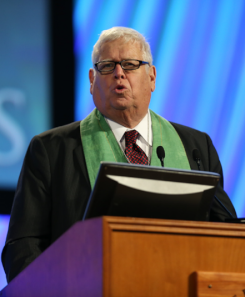With pipes and drums, prayers and song, reports and remembrances, the 222nd General Assembly (2016) of the Presbyterian Church (U.S.A.) began its work Saturday, encouraged by Heath Rada, Moderator of the 221st General Assembly (2014), to remember that “hope does not disappoint.”
Referring to the assembly theme, “Hope is our calling,” Rada reported on his two- year term as Moderator, which ended later in the day with the election of Co- Moderators to serve for the next two years. “For months I’ve had the privilege of listening to brothers and sisters around the church,” Rada said. “May we, you and I, be messengers for Christ in ways that will allow the world believe in him. “Hope does not disappoint, and we must not disappoint hope.”
The moderator’s report was the highlight of the afternoon session, which included orientation of commissioners and an introduction to Portland, which last hosted an assembly 50 years ago.
The bulk of the “issues, concerns and hopes” he has heard from those in the denomination fall into four areas, Rada said.
First is identifying who and what we are. Calling for a renewal of faith formation and proclamation, Rada said he heard a call from many voices to make the church an institution that encourages people to tell the story of Jesus Christ and to serve others.
“We must engage in radical listening in all areas of our church, but especially in evangelism,” he said. This call to evangelism was made difficult by “a largely unchurched cultural climate” in the United States and growing numbers of “nones” (those who profess no religious affiliation) and “dones” (those who once belonged to a church but have left).
“Yet people are asking for spiritual encounters which can help them make connections, embrace differences [and] live into commonalities with others,” he said. “We live in a society where people are longing to find a structure, a sanctuary if you will, that addresses deepest longing and questions … By joining our collective voices and our different perspectives, we might be able to tell even more people about Jesus.”
Second, re-vitalizing our congregations, in part by identifying the local churches where most people find their primary connections and relate to the congregations’ primary purposes. Rada said many local churches are seeking attention and support from the denomination.
He said small, rural congregations – which serve 80 percent of the denomination’s members – feel they are not getting enough support. “They realize they may not have the potential for growth in numbers,” he said, “but they do believe they can strengthen their ministry in the ways they embrace and nurture their members and communities.”
He said larger churches “say they are, in many cases, almost entities unto themselves,” and feel little connection to the national church or their presbyteries. “We need to explore what that means,” he said. “In essence, what I have heard is a desire for us to right-size our resources as a denomination and encourage and affirm new paradigms for congregational life, ministry and mission.”
The third major issue is justice for all people. Saying the PC(USA) has historically stood up against the cultural norm in the interest of promoting justice, Rada called for “a space where we can have a difference of opinion, and protect the individual conscience of our members. I’ve heard that cry expressed acutely as it relates to the areas of racial, economic … and religious justice. Presbyterians said we are called to be spokespersons for justice, both within and outside the church.”
“We must realize that through our denomination we have enjoyed the ability to address and lessen discrimination against our LGBTQ brothers and sisters,” he said, going beyond his prepared statements in light of the massacre in Orlando last weekend. “We must look for ways to do that which are loving and affirming.”
The fourth issue concerns education. “No denomination or Christian organization has directed more of its heart, soul and resources to education than the PC(USA),” Rada said. Applauding congregational education, educational camps and conference centers, seminaries and colleges, he said Presbyterians have had “a profound impact on public education in our nation and around the world.”
“I’ve had the privilege of going around the world and meeting in schools and education centers started by Presbyterians,” he said. “I’ve heard from many about their gratitude for the PC(USA), starting schools around the world, especially as we’ve directed resources for the education of women.”
Summarizing his remarks on the four areas Rada called “our common calling,” he asked: “Where do we go now? How are we to let go of our malaise and to respond as a family of faith? “My own instincts are that we will find our way, both remembering who we are and daring to be who we could be.”
The session followed a service of remembrance for the victims of gun violence in Charleston, South Carolina and Orlando, Florida.
Mienda Uriarte, coordinator of mission work in Asia and the Pacific for the Presbyterian Mission Agency, introduced ecumenical delegates from Bangladesh and Indonesia to offer their prayers and greetings.
Stated Clerk Gradye Parsons called the roll, greeting 594 commissioners from 171 presbyteries, 141 young adult advisory delegates, 20 theological student advisory delegates, eight missionary advisory delegates and 14 ecumenical advisory delegates.
The Committee on Local Arrangements welcomed the commissioners, delegates and advisors to Portland, home to nearly 40 of the 100 churches in the Presbytery of the Cascades.
As a pipe and drum team played “Canticle of the Turning,” COLA representatives paraded through the assembly hall with signs representing churches from the presbytery.
COLA Co-Moderator Beth Neel concluded the committee’s greetings with a wish: “May you find unexpected blessings and abundant joy this week.”
GA221 Vice-Moderator Larissa Kwong Abazia and Parsons led the assembly through what Parsons called “learning the nuts and bolts of how we do business during plenary meetings.”
The opening plenary concluded with a video celebrating Parsons, who is retiring at the Assembly’s conclusion.

